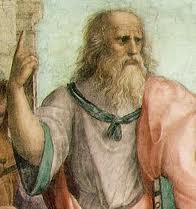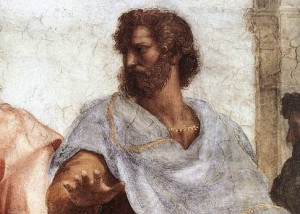Revisiting this deeply personal question: Do I have what it takes to be a philosopher-king?
Maybe not, according to Plato’s Republic Book 6 description of the true philosopher’s character. A real philosopher, he says:

1. Will love the pursuit of truth [485b],
2. Will be indifferent to the pleasures of the body [485d],
3. Will not be interested in money [485e],
4. Will not think human life is anything of great importance [486a], and
5. Will not be concerned with dying [486b].
After much soul-searching, I’m proud to report that I’m strong on point 1. But it is all downhill from there.
Part of Plato’s description of the true philosopher is driven by his metaphysics and epistemology. Truth is not to be found in this imperfect material world of “generation and decay,” so the questing philosopher must turn his back on this distracting lower realm and through pure reason seek the higher world of eternal truth and reality.
But part of Plato’s motivation is also political. Plato, as is well known, thinks the best political rulers will be philosopher-kings [473c, 540a]. Such rulers will be invested with great power — but they will have the wisdom and the character to wield it justly. Great power can be corrupting, and major sources of corruption are our desires for pleasure, wealth, and living the good life in the here and now. Consequently, the best character comes from conformity to points 1 through 5 above: such characters are less likely to be corruptible.
One more qualifying character trait should be added to the list. The true philosopher —
6. Will not want political power.
Those who do not want to rule are less likely to abuse power when they have it. Perhaps out of a sense of duty, Plato urges, the philosopher will assume political power over people [519-520]. Yet in any case those qualified must be forced to rule “whether they want to or not” [499b]. The conscripted philosophers will live communally [458c], their sex-and-reproductive lives will be directed by the State [458d-e], and they will not know who their children are [460b-d], thus removing nepotism as motive for political corruption.
So a disquieting thought: I much prefer a society of free people who pursue their own conceptions of the good life, and I have no desire to rule people — but according to point 6 that makes me an attractive candidate for compulsory philosopher-kingship. But I am a happy failure on points 2 to 5 above, so I am pretty sure I’m off the hook and free to pursue my liberal Aristotelian ways.

Few people realize how powerful an influence Plato was and became (via Augustine and others) later. Of course, he was a great writer and “dramatist” (The Dialogues) but his various doctrines appealed to the pagan mind, and not the nascent “Christian” sensibility. Plato’s “immortal soul” appeals to optimists’ imaginations, whereas Aristotle showed, more scientifically than metaphysically, that all “souls” are mortal. This is also the doctrine of the Hebrew scriptures : the Israelites did not believe in the “immortality of the soul.” Adam, according to Moses, “was created a living soul,” he was a soul, he did not have one. The life-force emanated from a higher realm or being. Plato replaced this personal life-giver with a metaphysical assumption. Being a philosopher-king, I think, means that philosophy and reason should rule one. Something like the Stoics and Cynics and men who prefer thought to sensation. Reason and logic rule thought, but if we “check our premises” we often find they are neither axiomatic or self-evident. Kant tried to explain this (a bit) but we now have scientists like Ray Kurzweil predicting that people can, through genetic adjustments, prolong their lives indefinitely. This would involve resetting the cell-clock which scientists (miraculously) have determined to be roughly 70 years. Moses came up with that, and the order of “creation” first. Point is, Platonism is a stimulus for any philosophic mind, whether one agrees with him or not. In antiquity it was said “Platonism is in the air.” But somewhat unroyally, it transferred mystical ideas into the Christian religion. Bottom line is that life everlasting could not be had from a “king” unless one got it in Heaven, which obviates our earthly Paradise, that even Ayn Rand claimed was achievable via human reason. Who would be the Philosopher King then? The Creator of the Universe (denied by philosophers who admit only a universe of energetic atoms) or the ill-starred Platonic ideal, which, by the nature of political power, we have never had. Politics involves the reconciliation of the rational and irrational, much like Plato’s famous chariot horses. Though it has many bright moments, human self-government is a saga of “screw or be screwed”. I would suggest that the “Kingdom of the Heavens” and the rational Paradise envisioned by so many thinkers are identical. But one must have life for any government to exist — and very few philosophers have essayed its basic fountainhead.
The history of Western Civilization is a contest between the ideas of Plato and Aristotle.
I once worked in a busy downtown Boston bookstore where I created a window display with two pyramids. At the top of one pyramid were some of the works by Plato, including The Republic. At the top of the other pyramid were Aristotle’s Logic and other works by Aristotle. From the apex of each pyramid I chose books that flowed from each of their philosophies respectively. Even I was amazed by the result.
That would make a great visual, Ken.
I have the photo buried somewhere. When I find it will post.
I should like to recommend Adamson’s THE HISTORY OF PHILOSOPHY WITHOUT GAPS, a podcast, via iTunes. He’s presently up to Boethius and covers time gaps variously, as the train of influence is often lacking. He also explains where no direct influences apply. Often, the original thesis may be lost but is discussed per critics or apostles.
I remember vaguely a historic-fiction about Plato and Dion by Mary Renault, I just looked up Dion on wikipedia: “Recalled in 355 BC, he became master of the whole city but alienated the population with his imperious behaviour and financial demands. His supporters abandoned him, and he was assassinated.” He seemed as stupid as Plato, but without is intellect. Neat contrast to Aristotle’s student Ptolemy who went on to establish an Egyptian dynasty. From what I know Aristotle infused Alexander the Great and his friends, knowledge of perception, integration of factors, science. Alexander is widely praised as the greatest general that ever lived, and he founded tens if not hundreds of cities, notably Alexandria. The normative elements of being able to create cities still flourishing 2 thousand years later, being able to never lose battle with all its super complex and life and death factors, and in Ptolemy’s case to pass on the knowledge of how to govern is remarkable. https://en.wikipedia.org/wiki/Ptolemaic_dynasty